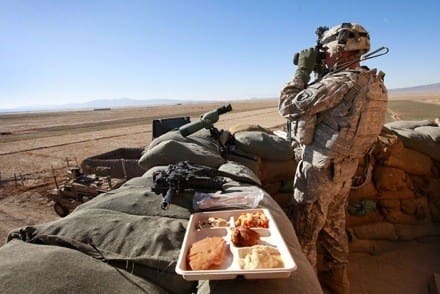Last month we spoke about the time investment required for an effective PT program. This month we need to address something I get more questions about than any other aspect of staying in shape; eating. If you’re a person that lives life on the run, (like I do) you know that you have to stay in top shape to do the things you need to do, and one of the biggest factors in helping you do this is how you eat. It should go without saying that what food (fuel) you put in your body is going to have a big impact on your physical performance, keeping your weight right and maintaining your long-term health. Its common sense to me, but a for many this seems to be a big issue.
Now if you pay any attention to what’s in the non-stop 24/7 media, you know that diet products, books and different eating systems are everywhere. Non-fat, low -carb, high-protein, Paleo, Vegan, blah, blah, blah. One day this food is the best thing for you, tomorrow it’s the worst, and this ever changing cycle of bullshit never seems to end. Over the years I have tried most of these “plans” myself, and I’ve seen the results of many other peoples attempts. Some seem to be effective (at least in the short term), many are just nonsense, and some are dangerous. My honest observation is that the overall results of the vast majority of different “systems” are inconsistent at best.
To start with, IMO, any eating plan that takes special foods, expensive supplements, or more than a few minutes a day in planning/perpetration is not going to last very long. So if you’re honest about it, and go by what you actually see and experience yourself you’ll also see that there is no such thing as a “perfect” diet. People, and what they need to do are different, and how food affects them varies widely. I have a high octane Navy SEAL buddy that lives on little more than dip, beer, fast food and chocolate, and I’ve seen overweight (and out of shape) people that are very strict vegetarians. The hard core Paleo people I know seem to split most of their free time between preparing special meals and trying to sell others on their pain in the ass eating plan. However, there are a few basic things I know from long experience that are consistent for high performance eating.
1) Eat a wide variety of natural, simple foods. Balance is the key.
2) Don’t eat too much, especially at one setting. A hungry leopard hunts best.
3) Drink plenty of water. A FEW beers is a good thing.
4) Stay away from junk food, and you know what that is genius.
5) You don’t need expensive supplements. Do 1-4 and a good multi-vitiman for insurance is enough.
Too simple, or maybe you need more detail to sweat the load about? In my book Corps Strength, I layout a effective and time tested high-pro eating plan that I was given about 30 years ago when I was a AAU boxer. Since then I’ve recommended It to hundreds of Marines and others to stay in shape and keep their weight in check. It’s simple and easy to follow, and its been proven to work for most people. Just like with a PT program, if your diet is too complicated it won’t work, not long term in any case. So stop wasting your time (and money) looking for the magic diet, supplement or food. It doesn’t exist. Just like anything else, what works is the consistent application of sound principles applied over the long term. Never easy, but it does work. Try it.
Semper Fi
MGunz
Tags: Corps Strength



Great tips and straight up. I hate all the diet fads, as a working Chef I know all too well that people are generally just over doing it.
One thing I feel left out is snacks… yes it’s good to not eat all in one sitting but having a snack in the middle of the day helps you stay focused and keeps just the right about of balance in the fuel tank. Something like fruit, vegetables or some granola goes a long way. Plus you won’t be distracted thinking about being hungry or worrying about the next time you eat.
If your friend that is a NAVY Seal he sure has bad lifestyle habits. He is missing out on some of the best research & information being supplied by the University Of Pittsburgh to the Seal community. Their long term research study & input has given NAVY an huge to help with SEAL longevity & performance issues.
NCAA sports nutrition & performance enhancement is on the cutting edge of sports science & dip, fast food and beer are not on the list for top performance.
Article:
Continuation and Expansion of Naval Special Warfare Projects
Since 2007 the NMRL has been investigating musculoskeletal injuries and human performance in the Naval Special Warfare (NSW) Group 2 in Little Creek, VA. Over the past year this effort has expanded to NSW Group 4, Special Boat Team-22, in Stennis, MS. These projects are focused on the development and refinement of the NSW’s Tactical Athlete Program in collaboration with their human performance, medical, and training personnel. In addition to the continuation of funding for the NSW Group 2 and Group 4 projects, the NMRL and NSW will begin a new research project with the Naval Special Warfare Center regarding Seal Qualification Training (SQT) and Crewman Qualification Training (CQT) at Coronado Naval Base in San Diego, CA.